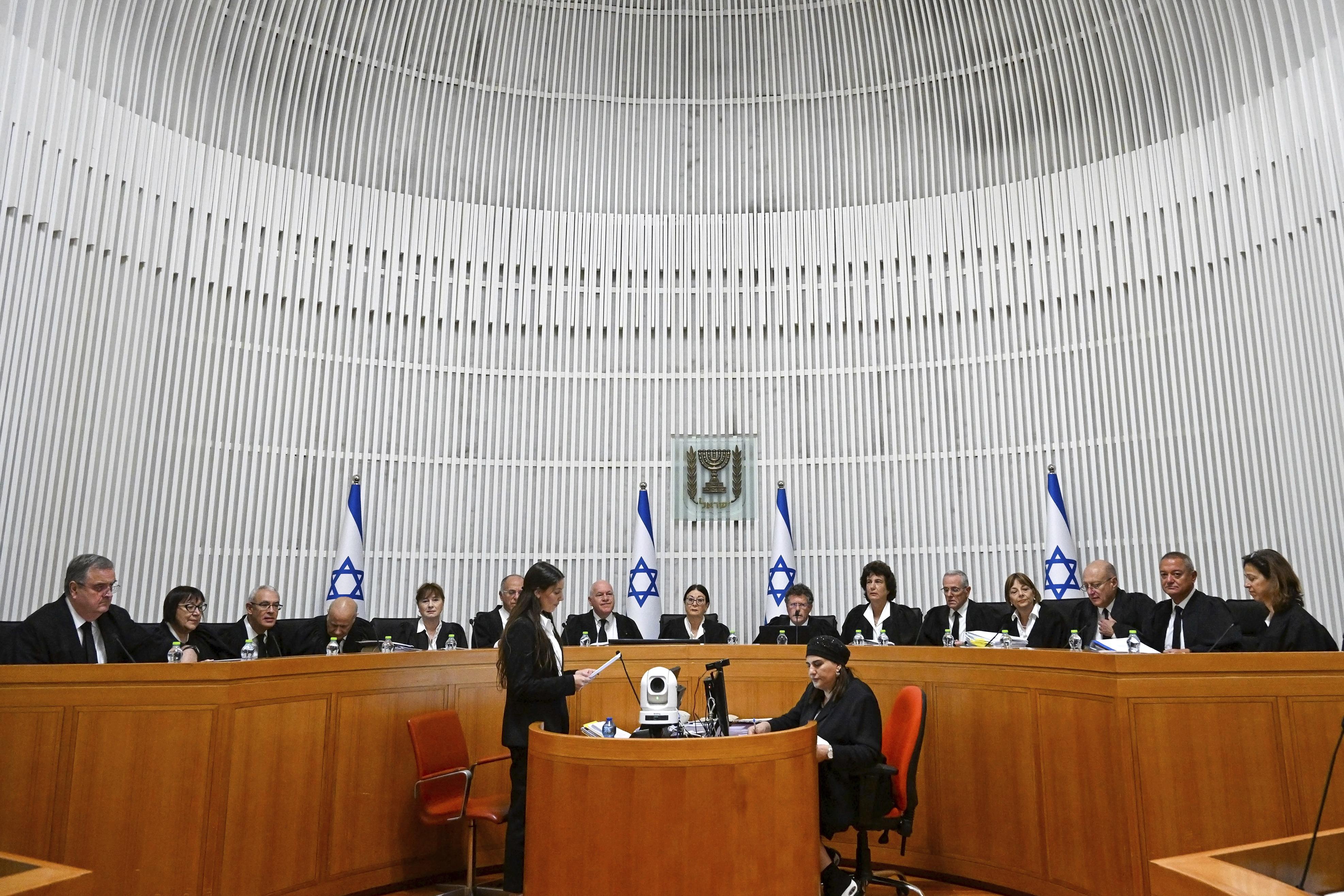 All 15 of Israel's Supreme Court justices appear for the first time in the country's history to look at the legality of Prime Minister Benjamin Netanyahu's contentious judicial overhaul, which the government pushed through parliament in July, in Jerusalem, Sept 12, 2023. (PHOTO / POOL VIA AP)
All 15 of Israel's Supreme Court justices appear for the first time in the country's history to look at the legality of Prime Minister Benjamin Netanyahu's contentious judicial overhaul, which the government pushed through parliament in July, in Jerusalem, Sept 12, 2023. (PHOTO / POOL VIA AP)
JERUSALEM - Israel's Supreme Court began hearing arguments on Tuesday against a bid by Prime Minister Benjamin Netanyahu's government to curb the court's powers, in a historic session which has inflamed a crisis that has divided the nation.
In a first for the court, all of its 15 judges convened to hear appeals by watchdog groups against a judicial amendment passed in July by Netanyahu's religious-nationalist coalition, part of a judicial overhaul that has sparked months of protests.
The amendment removed the court's power to strike down a national government or ministerial decision if it deemed the decision "unreasonable", although other tools for voiding executive decisions remain in place.
READ MORE: Protests grip Israel ahead of historic Supreme Court session
The government says the judicial changes, including to usage of the so-called "reasonableness clause", aim to stop unelected judges from meddling in politics. Opponents say the action threatens Israel's democracy by removing a vital check and balance. Even Israel's Western allies have voiced concern.
It could take weeks or even months for the court to rule. But the showdown pitting the judiciary against the executive and legislature has gripped Israelis. TV and radio stations aired wall-to-wall coverage of the court session.
As the hearing began, the shekel, which last week hit its lowest level in three years, weakened 0.2 percent in early trading.
Netanyahu's efforts to reach compromise agreements with opponents on the overhaul have so far been fruitless, adding to fears that Israel's worst domestic crisis in years will deepen
The crisis has split Israeli society. Hundreds of thousands of protesters have staged weekly demonstrations.
Business and civil society groups say the judicial changes risk undermining the economy. Military reservists - protest leaders say numbering in the thousands - have stopped reporting for duty in protest, which military chiefs say threatens national security.
ALSO READ: Israel on edge ahead of top court session on judicial overhaul
Justice Minister Yariv Levin, architect of the judicial overhaul, declared the Supreme Court session "a mortal blow to democracy and the standing of the Knesset", saying in a statement that the judges were unrepresentative and unelected.
The appellants say the amendment invites abuses of power by removing democratic checks and balances and opens the door to corruption. They say the swift legislation process was flawed.
'Who should oversee?'
The government says the Supreme Court has no authority to review amendments to Basic Law, which has a quasi-constitutional status in a role in a country without a formal constitution.
 Israelis protest against plans by Prime Minister Benjamin Netanyahu's government to overhaul the judicial system and in support of the Supreme Court ahead of a pivotal appeals hearing beginning on Sept 12, in Jerusalem, Sept 11, 2023. (PHOTO / AP)
Israelis protest against plans by Prime Minister Benjamin Netanyahu's government to overhaul the judicial system and in support of the Supreme Court ahead of a pivotal appeals hearing beginning on Sept 12, in Jerusalem, Sept 11, 2023. (PHOTO / AP)
Chief Justice Esther Hayut challenged a legal adviser for the Knesset, or parliament, who defended the bill, saying: "Who should oversee reasonable conduct on the part of the government? ... Do you agree that there should be law - but not an adjudicator of the law?"
Yair Lapid, centrist head of the parliamentary opposition, said the bill was "warped and thuggish", writing on social media platform X, formerly known as Twitter: "It's not worth getting into a national quarrel over such legislation."
Netanyahu, who is on trial for corruption charges he denies, says the judicial changes are meant to balance a Supreme Court that has become too interventionist. He has been hazy when asked whether he would abide by a ruling that would quash the new law.
READ MORE: Israel's judicial overhaul dismays environmentalists
His coalition started its judicial campaign in January, triggering protests, spooking investors and sending the shekel down as Western allies voiced concern about Israel's democracy.
Eyeing potential flare-ups with the Palestinians, Iran and the heavily armed Iran-backed group Hezbollah in neighboring Lebanon, Israelis have been rattled by the furor's impact on their military as some reservists have not reported for duty.
Netanyahu has said some of the original proposals have been scrapped. But his efforts to reach compromise agreements with opponents on the overhaul have so far been fruitless, adding to fears that Israel's worst domestic crisis in years will deepen.
READ MORE: Top Israeli court weighs in on Netanyahu's judicial overhaul
However, with two more appeals scheduled this month, a court ruling could come as late as January, leaving time for the sides to agree on reforms. Such an outcome would grant a reprieve after months of protests and signal stability to the markets.


